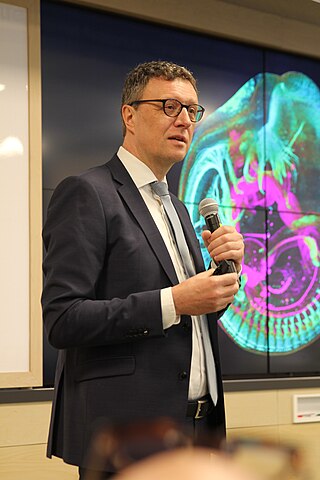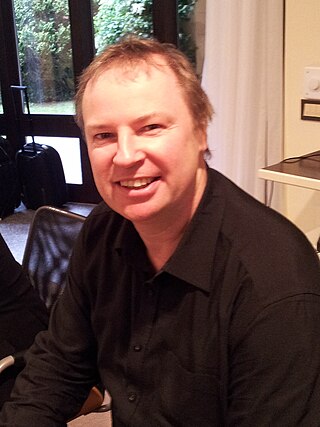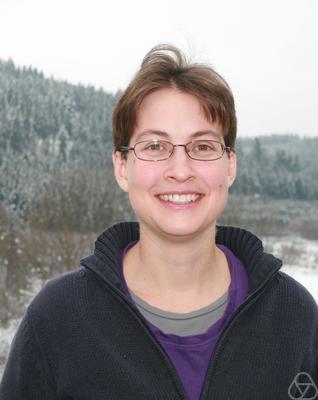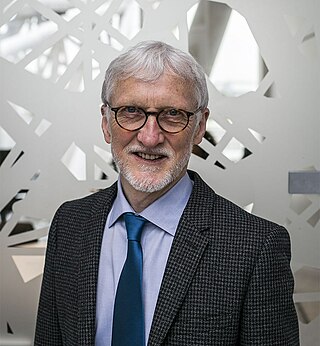Related Research Articles

The European Molecular Biology Laboratory (EMBL) is an intergovernmental organization dedicated to molecular biology research and is supported by 29 member states, two prospect member states, and one associate member state. EMBL was created in 1974 and is funded by public research money from its member states. Research at EMBL is conducted by more than 110 independent research groups and service teams covering the spectrum of molecular biology.

The Gottfried Wilhelm Leibniz Prize, or Leibniz Prize, is awarded by the German Research Foundation to "exceptional scientists and academics for their outstanding achievements in the field of research". Since 1986, up to ten prizes have been awarded annually to individuals or research groups working at a research institution in Germany or at a German research institution abroad. It is considered the most important research award in Germany.

Peter Gruss is a German developmental biologist, president of the Okinawa Institute of Science and Technology, and the former president of the Max-Planck-Gesellschaft.

Patrick Cramer is a German chemist, structural biologist, and molecular systems biologist. In 2020, he was honoured to be an international member of the National Academy of Sciences. He became president of the Max Planck Society in June 2023.

Matthias Werner Hentze is a German scientist. He is the director of the European Molecular Biology Laboratory (EMBL), co-director of the Molecular Medicine Partnership Unit between EMBL and Heidelberg University, and Professor of Molecular Medicine at Heidelberg University.

Peer Bork is a German bioinformatician. He is Director of the European Molecular Biology Laboratory (EMBL) site in Heidelberg, in south-west Germany.
Hans Robert Schöler is a molecular biologist and stem cell researcher. He is director at the Max Planck Institute for Molecular Biomedicine in Münster.

Jörg Hinrich Hacker is a German microbiologist. He served as president of the Robert Koch Institute from 2008 to 2010 and of the German Academy of Sciences Leopoldina from 2010 to 2020. He is the editor-in-chief of the International Journal of Medical Microbiology.
Ekkehard Karl Friedrich Bautz is a molecular biologist and chair of the Institute of Molecular Genetics at the University of Heidelberg.

Roger Sidney Goody is an English biochemist who served as director at the Max Planck Institute for Molecular Physiology in Dortmund from 1993 until 2013. Since 2013 he is Emeritus Director of the institute.

Maria Leptin is a German developmental biologist and immunologist, and the current President of the European Research Council. She was the Director of the European Molecular Biology Organization from 2010 to 2021.

Anna Katharina Wienhard is a German mathematician whose research concerns differential geometry, and especially the use of higher Teichmüller spaces to study the deformation theory of symmetric geometric structures. She is a director at the Max Planck Institute for Mathematics in the Sciences.

Iain William Mattaj FRS FRSE is a British scientist and Honorary Professor at Heidelberg University in Germany. From 2005 to 2018 he was Director General of the European Molecular Biology Laboratory (EMBL). He stepped down from the position at the end of 2018 following his appointment to Human Technopole. In January 2019 he took office as the first Director of Human Technopole, the new Italian institute for life sciences in Milan, Italy.

Katja Becker is a German physician and biochemist who has been serving as the president of the German Research Foundation (DFG) since 2020. She had previously been the organization's vice president from 2014 to 2019.
Rohini Kuner is an Indian-born German pharmacologist and director of the Institute of Pharmacology at Heidelberg University.
Jan O. Korbel is a German scientist working in the fields of human genetics, genomics and computational biology.
Stefan Mario Maul is a German Assyriologist and holder of the Gottfried Wilhelm Leibniz Prize.
Asifa Akhtar is a Pakistani biologist who has made significant contributions to the field of chromosome regulation. She is senior group leader and director of the Department of Chromatin Regulation at the Max Planck Institute of Immunobiology and Epigenetics. Akhtar was awarded EMBO membership in 2013. She became the first international and female vice president of the Max Planck Society's Biology and Medicine Section in July 2020.
Daniel Wolfram Gerlich is a German cell biologist. Since 2012 he has been a Senior Group Leader at the Institute of Molecular Biotechnology (IMBA) of the Austrian Academy of Sciences in Vienna.
Dirk Görlich, born October 18, 1966, in Halle (Saale) of Germany, is a German biochemist. He is now director at the Max Planck Institute for Multidisciplinary Sciences in Göttingen.
References
- 1 2 O'Connor, Terry (8 December 2022). "New chair of EMBL Council". EMBL. Retrieved 11 July 2024.
- ↑ "Peter Becker". German Academy of Sciences Leopoldina. Retrieved 26 May 2021.
- (in German) Porträt at the Deutsche Forschungsgesellschaft